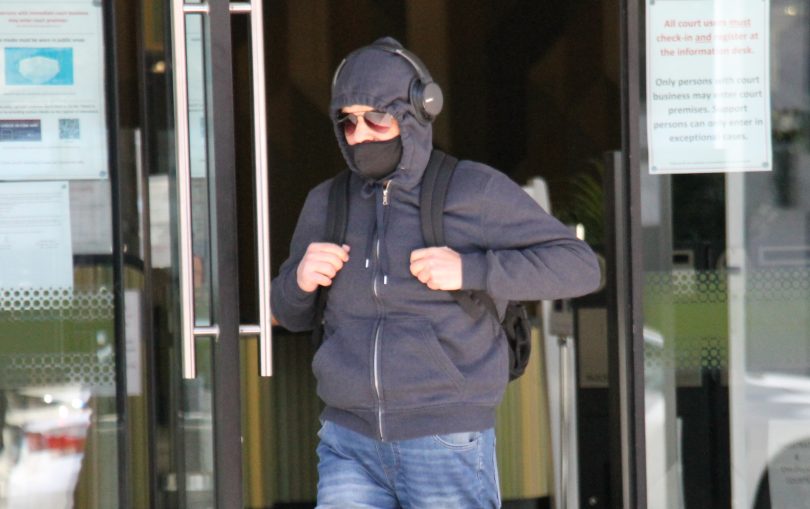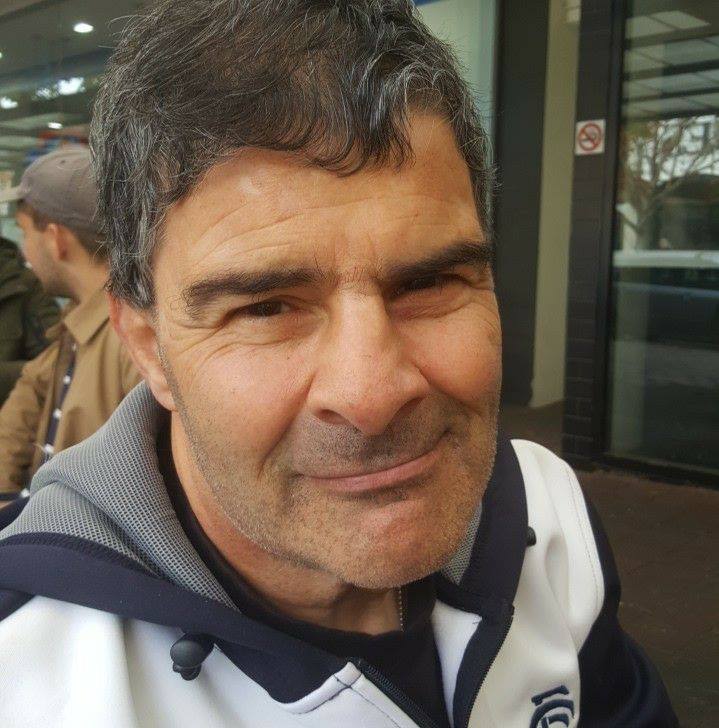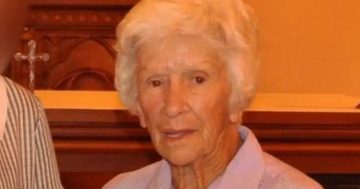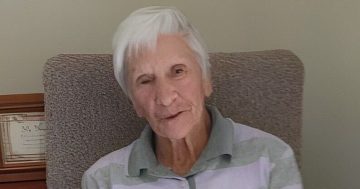
Mario Amato, 61, leaves the ACT Courts on Wednesday after the closing arguments for his case. Photo: Albert McKnight.
While it has been suggested to a court that an elderly woman believed a nursing home resident allegedly pushed her before her death, the man’s legal team says he had no motive to harm her and, in fact, “really liked” her.
Mario Amato, 61, pleaded not guilty to a charge of manslaughter over the death of 89-year-old Sheila Marie Capper when his judge-alone trial began in the ACT Supreme Court earlier this month.
The court heard he allegedly pushed Ms Capper out of a laundry at the Southern Cross aged care facility in Campbell, where they were both residents, on 13 November 2018. She fell and fractured her hip, then later died.
Closed-circuit television footage (CCTV) screened to the court captured her fall into the hallway, but not the alleged push inside the laundry, before staff arrived to find her lying on the ground.
During the closing submissions on Wednesday (22 September), Justice Michael Elkaim said the two major issues were whether Mr Amato pushed Ms Capper and if that caused her death.
Crown prosecutor Rebecca Christensen said when Ms Capper was on the ground, she told staff, “he pushed me, he pushed me”.
She said when Mr Amato left the laundry room, Ms Capper told staff, “that man, he did it, he did it”.
Ms Christensen alleged these statements, and the CCTV footage, led to the “inescapable conclusion” that Mr Amato pushed her “with a level of force”.
“There is no reason to think Ms Capper would have died when she did had she not fractured her hip,” she said.

Mario Amato has pleaded not guilty to a charge of manslaughter. Photo: Facebook.
She said Mr Amato had given a range of descriptions of what happened with Ms Capper, so argued his accounts were unreliable.
He even gave a “fanciful version” of what he did after she fell, she said. He said he had come out of the laundry and Ms Capper told him that “she’s alright, she’ll get up in a moment”. But Ms Christensen said that “simply didn’t happen”, as CCTV showed he was not next to her long enough to talk to her.
But Jon White SC said the Crown had not established enough evidence of what exactly happened inside the laundry and his client had consistently denied deliberately harming Ms Capper.
He said his client had entered the laundry, the door had closed behind him but not locked properly, then Ms Capper followed him in, but she didn’t have any clothing with her to iron.
With her “discombobulated thinking”, he said, this could explain why she then headed back through the laundry door as she may have realised she needed to get something to iron.
In one version of events Mr Amato provided, he said that after she entered the room, he guided her back to the door, and the door closed while he wasn’t looking at it.
Mr White said Ms Capper had dementia that was getting worse and had infirmities with her vision and hearing.
He said she was a high fall risk, which meant she had a “propensity for falling” and had been banned from the laundry.
“It is clear that the laundry was a dangerous environment for Ms Capper to be in,” he said.
“We know that it was cluttered. We know there was a trolley in there. And there were various other impediments, including a battered waste paper bin.”
However, Ms Christensen said being a high fall risk did not mean it was “inevitable” that she would fall. She said she was mobile, had never fallen in the nursing home before and did not have end-stage dementia.
Mr White said his client had “really liked” Ms Capper and was sad that she died. He also said Mr Amato was “very concerned” about not breaking any rules inside the nursing home because he wanted to get out of the facility.
Mr White said the surgery for Ms Capper’s broken hip was uneventful and not a source of her post-operative infection, an infection that likely came from pancreatic cancer.
He said Justice Elkaim could not rule out that the cause of her death was the infection caused by the cancer.
Mr Amato had also pleaded not guilty to an alternative charge of causing grievous bodily harm.
Justice Elkaim has reserved his decision and will announce his verdict later.




















I might watch it if it makes it to one of the streaming services, but it doesn’t seem worth the… View